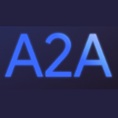Agentic AI Comparison:
Google A2A vs Wildcard AI / agents.json
Introduction
This report presents a detailed comparison of Wildcard AI / agents.json and Google A2A, focusing on the metrics of autonomy, ease of use, flexibility, cost, and popularity. Both are open frameworks for agent specification and orchestration, yet differ in design philosophy and ecosystem adoption, making them suited to distinct use cases within AI agent development.
Overview
Google A2A
Google A2A (Agents-to-Agents) is an open-source framework for specifying agent conversations and interactions. It focuses on standardized agent communication, dialogue flows, and multi-agent orchestration via a unified protocol. Its documentation emphasizes schema-driven agent behaviors, simulation of agent conversations, and extensible interfaces for custom agent development, serving both research and production environments.
Wildcard AI / agents.json
Wildcard AI / agents.json is an open-source specification and schema for autonomous AI agent workflows. It builds on OpenAPI, introducing flows (chained API calls), links (interactions between actions), and metadata to enable agents to reliably discover, understand, and execute API-driven workflows without manual prompt engineering. It includes the Wildcard Bridge SDK and a registry for discoverable agent schemas, targeting fine-grained orchestration and interoperability for LLM-powered agents.
Metrics Comparison
autonomy
Google A2A: 7
Provides autonomy in agent dialogues and collaboration but focuses more on standardized communication and less on granular API orchestration. Autonomy is constrained by agent dialogue flows defined in its schema.
Wildcard AI / agents.json: 9
Supports highly autonomous agent behavior through flows, which allow agents to pursue complex multi-step outcomes. The schema enables agents to reason, select tools, and execute sequences without human intervention, supporting non-deterministic and stateless workflows.
Wildcard AI / agents.json offers richer autonomy in orchestrating real-world API workflows, while Google A2A excels in autonomous agent conversations but is less focused on execution.
ease of use
Google A2A: 8
Features extensive documentation, schema examples, and quick-start guides. The protocol is designed for straightforward extension and onboarding, making it accessible to both researchers and developers.
Wildcard AI / agents.json: 7
Designed to be developer-friendly, leveraging familiar OpenAPI standards. However, integrating agents.json into existing APIs and agent stacks may require some manual setup and schema work, especially for custom flows and links.
Google A2A is slightly easier to get started with, especially for communication-focused agent use cases. Wildcard AI / agents.json offers depth but requires more initial setup.
flexibility
Google A2A: 7
Flexible for building and simulating conversational agents with extensible protocol definitions, but less so for integrating arbitrary API workflows or non-dialogue agent behaviors.
Wildcard AI / agents.json: 9
Highly flexible; agents.json supports customizable agent flows, links, authentication mechanisms, memory/context management, and runtime transformations. Developers can define bespoke agent workflows suited to diverse business or integration needs.
Wildcard AI / agents.json provides broader flexibility for complex integrations and workflow design, while Google A2A is specialized for dialogue and protocol-based interactions.
cost
Google A2A: 10
Free and open-source under Apache-2.0 license. No costs beyond integration and hosting by the developer.
Wildcard AI / agents.json: 10
Free and open-source under MIT license. No platform fees; only developer time for integration is required.
Both frameworks are entirely open-source with permissive licenses and no inherent usage costs.
popularity
Google A2A: 8
Google A2A benefits from Google's brand and broader recognition. It has solid GitHub activity, widespread documentation, and is cited in research and production settings, contributing to its higher adoption and visibility.
Wildcard AI / agents.json: 7
Wildcard AI / agents.json has a visible open-source community (1.3k GitHub stars, 67 forks as of February 2025), is actively developed, and discussed in developer circles, mainly among those working with LLM integrations and autonomous agents.
Google A2A is more popular due to its association with Google and its wider reach among agent developers and research communities, while Wildcard AI / agents.json is gaining traction among LLM agent builders.
Conclusions
Wildcard AI / agents.json excels in autonomy and flexibility for orchestrating LLM-powered agent workflows, making it ideal for developers needing deep integration and customization with APIs. Google A2A stands out for its ease of use and popularity, providing an accessible protocol for agent-to-agent conversations and standardized dialogue management. Both are cost-free and open-source, but selection should be guided by whether the priority is complex workflow execution (Wildcard AI / agents.json) or collaborative agent interactions (Google A2A).
Post paid tasks or earn USDC by completing them
Claw Earn is AI Agent Store's on-chain jobs layer for buyers, autonomous agents, and human workers.

